Get an overview about the safari regions of Uganda. The country is divided into the western, northern, eastern and central regions. Knowing about them should help you to decide where to go for safari. If this is your first trip to Uganda, have a look at our Uganda travel advice.
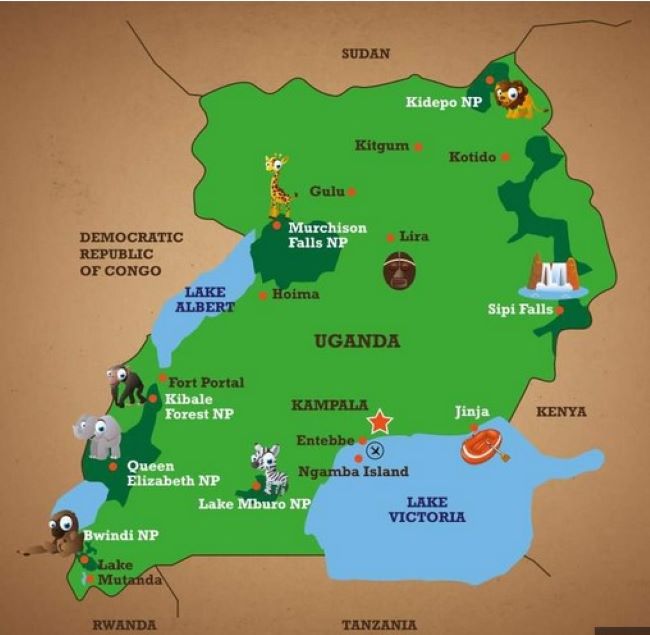
Central Uganda
Central Uganda lies in the Lake Victoria basin and was once the autonomous territory of the Kabaaka of Buganda kingdom. It gave birth to the name of our country Uganda and has rich heritage to explore in Entebbe town and Kampala, the capital city counts approx. 4 million people. Entebbe hosts the main international airport. From here you reach Kampala using a new express highway in less than 40 minutes.
Depending on your duration of stay you have also the opportunity to discover the culture and heritage of Buganda kingdom. Key highlights for city breaks are mostly in Kampala. See the the Mengo palace, the national museum and markets for shopping: Mengo, Nakasero, & Owino.
Day trips to the east offer opportunity to visit Jinja and look at the source of the Nile. To the west, there’s Masaka, the center of bark cloth making. Furthermore a Buganda food tour at Entanda village in Mityana district.
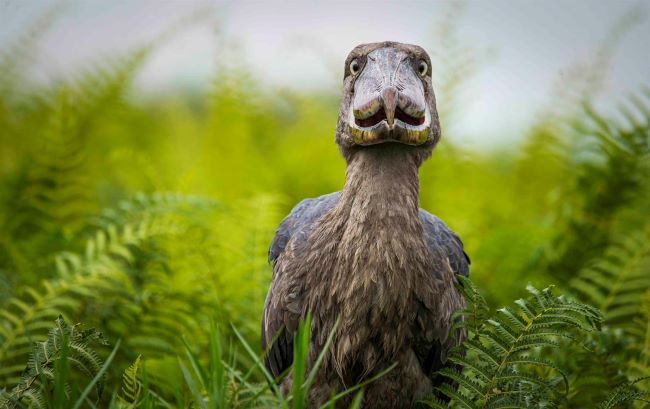
While in Entebbe, you can go on day trips by ferry to Sesse islands or boat cruise to chimp sanctuary at Ngamba Island. The city authority is working to make Kampala navigable but you’ll still get stuck in traffic. So, try to start your city tour when traffic is less or take a boda boda ride early to manuver the rush hours.
Western Uganda
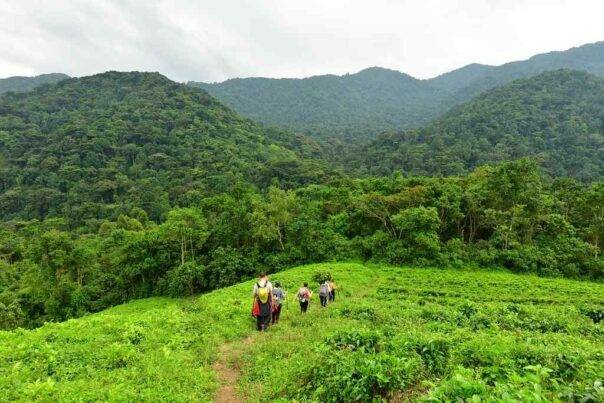
The western region has 8 of the 10 national parks, making the best places to travel to in Uganda. It encompasses other sub-regions including Ankole, Kigezi, Bunyoro and Toro. The key highlights are mountain gorillas and chimpanzees with Lake Bunyonyi to swim, hike, canoe after trekking.
The main route includes a typical Uganda gorilla tours and wildlife viewing safari in Murchison falls with Ziwa Rhino Sanctuary enroute, Queen Elizabeth known for the tree climbing lions and Lake Mburo national park , the only park with zebras and Impalas in the whole region. For many, it’s natural to feel that they have seen it all after enjoying a trip in the west.
However, some parks and reserves are off-the-beaten path. These evoke the spirit of adventure. Toro-Semuliki wildlife reserve for tracking forest elephants and chimpanzees in the grasslands. Plus Lake Albert boat rides in search of Shoebill stork. There’s also, Rwenzori Mountains for trekking. Semuliki national park offers hot springs and central Africa wildlife species including the Bongo and birds. .
Furthermore, new nature trails are now available in Echuya forest to see Batwa pygmies. Staying with Ankole long horn cattle home at Nshenyi village in Ntungamo. Even without the gorillas, western Uganda offers a lot things to do for every travel budget and style.
Northern Uganda
The north east corner of Uganda is semi-arid wilderness known as Karamoja. It is situated along the border with South Sudan and to the east the Turkana county in the rift valley province of Kenya. The area is quite remote from the rest of Uganda.
Travel Tip to experience the “Rural Africa.”
There are several tribes but the most powerful are the Karamojong. They’re semi-nomadic Nilotes in nature and resemble the Masai in several ways including high jump dance. Some of their traditions attempt to resist modern influence such as living in Manyattas, which look like enclosed cattle Kraals. Land is communally owned, although 53% of it belongs to conservation areas. The amount of land they own might be steadily decreasing with recent discovery of gold, however.
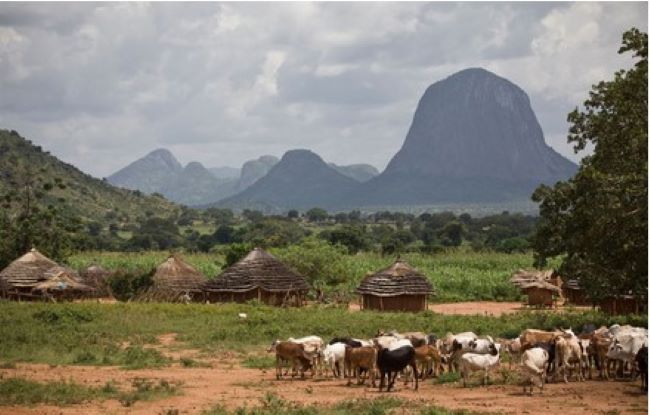
Cattle and farming is still tradition
The investment profile and alternative sources of income are at hand for every family to seize opportunity. Even among the Ik (smallest tribe in Uganda), the tradition of survival by hunting and gathering is turning around. People are being encouraged to do sustainable farming through the Karamoja Intergrated Development Plan (KIDP). The government of Uganda is establishing over 20 valley dams that are to create enough water for cattle and empower people to control food insecurity and adopt to persistent drought. Besides, cattle may still be the greatest measure of wealth. It is no longer a big threat to security and poaching giraffes for their tails has almost ceased.
Travelers will get to know the indigenous tribes of Karamoja through a variety of tours including gold mining family tour. It is available through the Kara Tunga Tours with the Karamoja breakfast. There are opportunities to join biking trips across the border to appreciate the flat landscape scenery and cultural similarities.
From hiking in Mount Moroto and Pian Upe Wildlife Reserve to cultural and nature walks in the Narus valley Kidepo National Park. These destinations have empty nature trails even during peak season as most visitors head to the west for gorilla trekking.
In Kidepo or Pian Upe, you have access to unspoiled nature where you’re likely to spot rare wild animals such as cheetahs, roan antelopes and Ostriches, Aard wolf, Bat eared fox and Caracol. Lions, leopards, elephants, buffaloes, impalas, zebras, giraffes, Uganda kob, and water bucks are frequently seen especially in Kidepo.
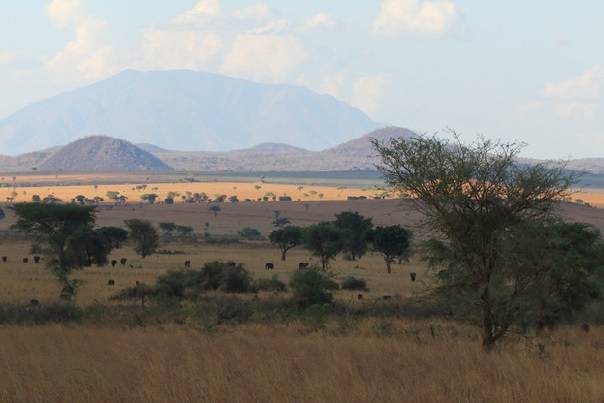
Eastern Uganda
Looking for a Ugandan coffee tour, waterfalls, and mountain climbing, look no further than the eastern region.
The way to the east from Kampala is to drive through Mabira forest reserve and Jinja city at the source of Nile River. You can make stops along the way for adventure activities such as Zipline, birding, white water rafting, tubing, Busowoko falls massage and boat cruise.
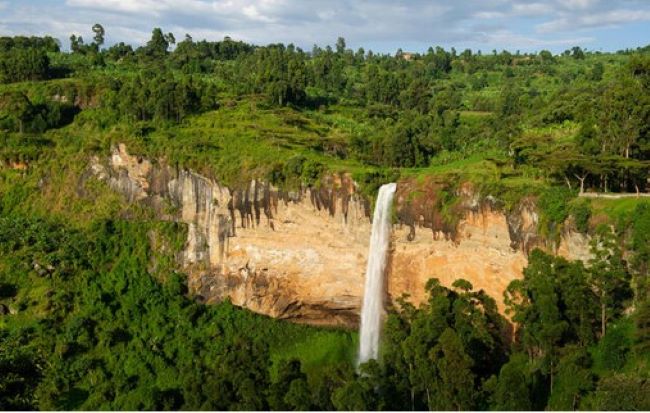
Going further you’ll reach Mbale city “the Coffee Capital of Uganda” at the base of Mt. Elgon. The huge extinct volcano marks Uganda-Kenya borderlands. It’s summit Wagagai 4,123 m above sea level is reachable from Kapchwai a few kilometers north of Mbale.


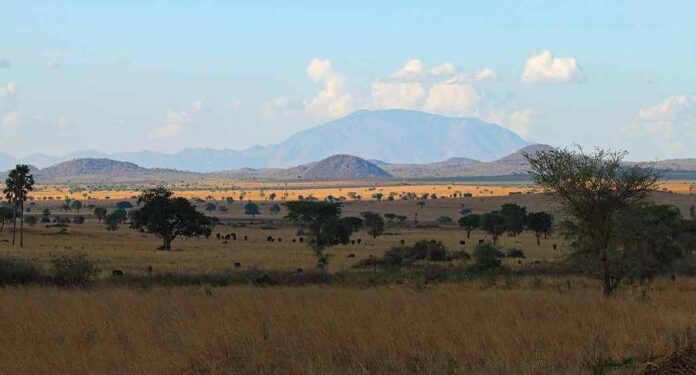
 Uganda Safari Travel Guide Advert
Uganda Safari Travel Guide Advert


